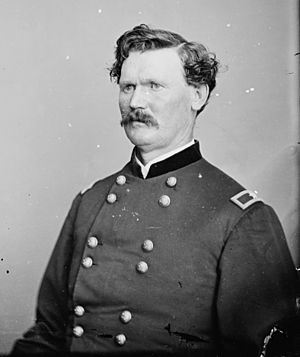Robert Kingston Scott facts for kids
Quick facts for kids
Robert Kingston Scott
|
|
|---|---|
 |
|
| 74th Governor of South Carolina | |
| In office July 6, 1868 – December 7, 1872 |
|
| Lieutenant | Lemuel Boozer Alonzo J. Ransier |
| Preceded by | James Lawrence Orr |
| Succeeded by | Franklin I. Moses, Jr. |
| Personal details | |
| Born | July 8, 1826 Armstrong County, Pennsylvania |
| Died | August 12, 1900 (aged 74) Napoleon, Ohio |
| Resting place | Glenwood Cemetery, Napoleon, Ohio |
| Political party | Republican |
| Profession | physician, lawyer |
| Military service | |
| Allegiance | United States of America Union |
| Branch/service | United States Army Union Army |
| Years of service | 1861–1868 |
| Rank | |
| Commands | 68th Ohio Infantry |
| Battles/wars | American Civil War |
Robert Kingston Scott (July 8, 1826 – August 12, 1900) was an American politician from the Republican Party. He served as the 74th governor of South Carolina. Before becoming governor, he was an officer in the Union Army during the American Civil War. In 1891, he built a beautiful Victorian home in Napoleon, Ohio, where he lived until he passed away in 1900. This house is still standing today.
Contents
Early Life and Start
Robert K. Scott was born in Armstrong County, Pennsylvania. He came from a family with a military background. His grandfather fought in the American Revolution, and his father served in the War of 1812. Robert Scott studied medicine and started working as a doctor in Henry County, Ohio. While living in Ohio, he joined the Liberty Party, a group that was against slavery.
Service in the Civil War
In October 1861, Scott became a lieutenant colonel in the 68th Ohio Infantry. He was promoted to colonel of that regiment in 1862. He served in Tennessee, where he led the advance of Major General John A. Logan's division into Mississippi. He fought in important battles like Port Gibson, Raymond, and Champion Hill.
Later, he led a brigade in the XVII Corps. He was captured near Atlanta. Records show he was part of a prisoner exchange in September 1864. After his release, he joined William Tecumseh Sherman's operations around Atlanta and in the famous march to the sea.
Scott was made a brigadier general of volunteers on January 12, 1865. He also received special honorary ranks (called brevet ranks) of brigadier and major general in the volunteer army.
After the War
Between 1865 and 1868, General Scott worked as an assistant commissioner for the Freedmen's Bureau in South Carolina. This bureau helped newly freed African Americans after the Civil War. In July 1868, he left the Regular Army and began his political career.
Governor of South Carolina
Later in 1868, Robert Scott became the first Republican governor of South Carolina during the period known as Reconstruction. In 1870, a new rule in the South Carolina Constitution allowed a governor to be re-elected right away. This meant Scott was the first governor of South Carolina to serve two terms in a row. He won his re-election by a large number of votes.
During his time as governor, there was a lot of violence from groups like the Ku Klux Klan. At the same time, the federal government was trying to reduce its military presence in South Carolina. This made Scott's job very difficult. Most of the people who voted for Scott were newly freed African-American citizens. Many white South Carolinians were strongly against him.
Some of Scott's political friends, like the African-American leader Benjamin F. Randolph, were attacked. Governor Scott decided to arm African Americans to protect the state's Republican government. He formed militias that were open to anyone. However, white South Carolinians refused to join, so these groups became known as "black militias." Many of these militias were led by white officers who had fought for the Union or by educated African Americans from northern states.
Scott received support from President Ulysses S. Grant. However, the lack of full military support and general indifference from the North made his efforts harder. In some areas like Colleton County and Charleston, Scott had enough federal troops to keep order and ensure fair elections. But in other rural areas, he did not have enough support to stop the violence.
Return to Ohio
In 1877, Scott moved back to Napoleon, Ohio. This happened when the Democrats took power in South Carolina. He settled down with his family.
Scott passed away in Napoleon and was buried in Henry County, Ohio.
Images for kids
See also
- List of American Civil War generals (Union)
- List of Ohio's American Civil War generals
- Ohio in the American Civil War



